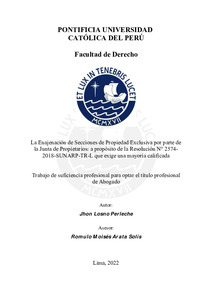| dc.contributor.advisor | Arata Solís, Rómulo Moisés | |
| dc.contributor.author | Losno Perleche, Jhon | |
| dc.date.accessioned | 2022-08-01T22:08:56Z | |
| dc.date.available | 2022-08-01T22:08:56Z | |
| dc.date.created | 2022 | |
| dc.date.issued | 2022-08-01 | |
| dc.identifier.uri | http://hdl.handle.net/20.500.12404/22906 | |
| dc.description.abstract | El presente informe jurídico analiza la Resolución N° 2574-2018-SUNARP-TR-L, en
relación a la transferencia de secciones de propiedad exclusiva de la Junta de Propietarios
en el Régimen de Propiedad Exclusiva y Propiedad Común, y la aprobación, por parte de
los propietarios, para la enajenación de estos bienes, extremo en el que cuestiono la
postura del Tribunal Registral que exige la manifestación de voluntad de propietarios que
representen dos tercios de las participaciones sobre los bienes comunes para que se
puedan vender bienes de propiedad exclusiva bajo la titularidad de la Junta. Para ello,
primero se examina la naturaleza jurídica de la Junta, a lo que sostengo que se trata de un
sujeto de derecho con subjetividad jurídica relativa, y que, por tanto, puede adquirir y
disponer de bienes a nombre propio, lo cual no le quita el carácter de exclusivo al bien
adquirido. Posteriormente, señalo que, si la finalidad de la adquisición del bien exclusivo
por parte de la Junta es la enajenación, no hay razón para que se requiera una mayoría
calificada, sino únicamente absoluta, pues ya ha habido un acuerdo previo en la Junta
para vender; de esta forma, el tercero de buena fe quedará protegido si es que revisa dicho
fin, lo cual consta en acta de sesión de Junta de Propietarios. Luego, explico la
representación que debe tener la Junta para la transferencia los bienes de dominio
exclusivo, a lo que afirmo que el presidente representa a la Junta (y no a los propietarios)
en la transacción, cuya formalidad es la Escritura Pública. Finalmente, llego a la
conclusión de que, para los actos de disposición de disposición de las secciones exclusivas
bajo la titularidad de la Junta, solo se requiere de los votos de la mayoría absoluta, y no
calificada, lo cual merece una modificación a la Ley N° 27157 y su Reglamento | es_ES |
| dc.description.abstract | This legal report analyzes Resolution No. 2574-2018-SUNARP-TR-L, in relation to the
transfer of sections of exclusive property of the Board of Owners in the Exclusive
Property and Common Property Regime, and the approval, by the owners, for the
alienation of these assets, extreme in which I question the position of the Registry Court
that requires the manifestation of will of owners representing two thirds of the shares over
the common property in order to be able to sell exclusive property assets under the
ownership of the Board. To this end, first the legal nature of the Board is examined, to
which I argue that it is a subject of law with relative legal subjectivity, and that, therefore,
it can acquire and dispose of property in its own name, which does not detract from the
exclusive nature of the property acquired. Subsequently, I point out that, if the purpose of
the acquisition of the exclusive property by the Meeting is the alienation, there is no
reason to require a qualified majority, but only an absolute majority, since there has
already been a previous agreement in the Meeting to sell; in this way, the third party in
good faith will be protected if it reviews said purpose, which is recorded in the minutes
of the meeting of the Owners' Meeting. Then, I explain the representation that the Board
must have for the transfer of the goods of exclusive domain, to which I affirm that the
president represents the Board (and not the owners) in the transaction, whose formality is
the Public Deed. Finally, I come to the conclusion that, for the acts of disposition of the
exclusive sections under the ownership of the Board, only the votes of the absolute
majority are required, and not qualified, which deserves an amendment to Law No. 27157
and its Regulations. | es_ES |
| dc.language.iso | spa | es_ES |
| dc.publisher | Pontificia Universidad Católica del Perú | es_ES |
| dc.rights | info:eu-repo/semantics/openAccess | es_ES |
| dc.rights.uri | http://creativecommons.org/licenses/by/2.5/pe/ | * |
| dc.subject | Propiedad horizontal--Legislación | es_ES |
| dc.subject | Derecho de propiedad--Perú | es_ES |
| dc.subject | Asociaciones de propietarios--Aspectos legales--Perú | es_ES |
| dc.subject | Derecho registral--Legislación--Perú | es_ES |
| dc.title | La Enajenación de Secciones de Propiedad Exclusiva por parte de la Junta de Propietarios: a propósito de la Resolución N° 2574- 2018-SUNARP-TR-L que exige una mayoría calificada | es_ES |
| dc.type | info:eu-repo/semantics/bachelorThesis | es_ES |
| thesis.degree.name | Abogado | es_ES |
| thesis.degree.level | Título Profesional | es_ES |
| thesis.degree.grantor | Pontificia Universidad Católica del Perú. Facultad de Derecho. | es_ES |
| thesis.degree.discipline | Derecho | es_ES |
| renati.advisor.dni | 10476208 | |
| renati.advisor.orcid | https://orcid.org/0000-0003-3472-1159 | es_ES |
| renati.author.dni | 73894346 | |
| renati.discipline | 215106 | es_ES |
| renati.juror | Fernandez Salas, Jose Carlos | es_ES |
| renati.juror | Arata Solís, Romulo Moisés | es_ES |
| renati.juror | Ravina Sanchez, Raul Fernando | es_ES |
| renati.level | https://purl.org/pe-repo/renati/level#tituloProfesional | es_ES |
| renati.type | https://purl.org/pe-repo/renati/type#trabajoDeSuficienciaProfesional | es_ES |
| dc.publisher.country | PE | es_ES |
| dc.subject.ocde | https://purl.org/pe-repo/ocde/ford#5.05.01 | es_ES |






